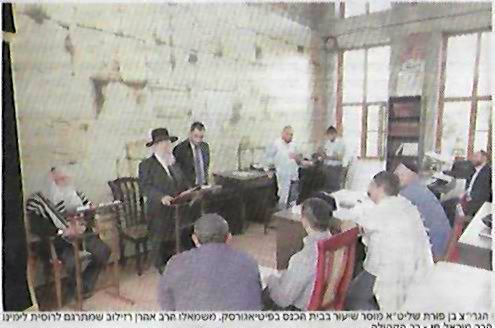HaRav Porat speaking this week

On Sunday, the 11th of Tammuz, HaRav Yosef Tzvi Ben Porat, Rosh Yeshivas Ashrei HaIsh, went forth, accompanied by two disciples, HaRav Aharon Razilov and HaRav Zalman Rubin, who officiated in the Pitiagrosk congregation, for a booster visit in that community which lies in the Caucasus region.
The Jewish communities in Caucasus date back to ancient times and were known to be very devout in practice and replete in Torah. The Jews there sacrificed their very lives in struggles against the Moslems who attempted to force them to embrace Islam. Three hundred years ago, they were called `the Mountain Jews' because they fled to the mountains, where they built fortifications from which they fought their enemies with fierce courage, vanquished them and continued to preserve their traditional heritage.
When the Rav visited the first time, eight years ago, he was shocked. He met young people who had assimilated with the gentiles of the area. When he inquired about this, they said that they are no different than their own `rabbi' who appointed himself as the chief rabbi of the Caucasus area. The man in question served as the shochet for twenty years, even though by halachic standards, he was not fit to do so and was totally ignorant in the laws of shechita. The mikveh there, not surprisingly, contained no water; the beis knesses had no siddurim nor any other religious articles.
Rav Ben Porat's interpreter was his student escort- attendant, Rav Aharon Razilov, who had lived in Pitiagrosk and studied in the Jewish school which was funded by one of the chareidi residents. When he went to visit the school, it turned out that 90% of the students weren't even Jewish!
HaRav Ben Porat immediately summoned all of the distinguished and wealthy members of the community, and in spite of a heavy snowfall, fifteen people attended. He inquired why, with the collapse of Communism twenty years before, Judaism was flourishing in Moscow, Petersburg and many other places. They boasted shuls, yeshivos, kollelim, chadorim, mikvaos and Beis Yaakov schools while here, the train was hurtling towards spiritual suicide. Those who attended assured him that they desired a spiritual revival.
When he returned to Yerushalayim, HaRav Ben Porat selected three couples who came from the Caucasus area from amongst the students of Yeshivat Ashrei HaIsh. For seven months he trained them - one as a shochet, another as a shaliach tzibbur, and the third to do outreach with the students. One wife as trained as a balanis to run the mikveh, another as a teacher for kallos and the third as a school teacher.
The local `rabbi' tried to torpedo all of their activities but a new administration was organized, headed by one of the wealthy residents, Aharon Mordechayov, who stemmed from a very prestigious family. He took upon himself the project of rehabilitating the community and building it anew. He was assisted by the president of the Congress of European Rabbis and the Chief Rabbi of Moscow, HaRav P. Goldschmidt, as well as with the help of Mr. Uri Kanner, president of the Jewish- Russian Congress, who decided to help this community and allocate budgets to help reestablish authentic Jewish life there. Thanks to their efforts, Yiddishkeit has made a comeback and the community has returned to its roots.




